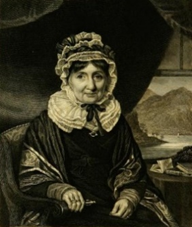Anne Macvicar Grant, Mrs Anne Grant of Laggan
1755-1838
A Scottish poet and author best known for her collection of mostly biographical poems Memoirs of an American Lady as well as her earlier work Letters from the Mountains. Born in Glasgow to British military officer Duncan Macvicar, Anne mainly grew up in and around Albany, New York, where her father was stationed. Eventually, her father received a grant of land in Vermont, which he began expanding with the intention of settling the family down permanently. However, he fell ill and decided to return to Scotland temporarily in 1768, when he was put in charge of Fort Augustus. There Anne met Rev James Grant, chaplain to the fort, marrying him 1778. They then settled down to start a family in the Highland parish of Laggan. Her travels through the Highlands of Scotland during this time would come to greatly impact her future literary work, which draws heavily on the imagery of the region. She was married to Grant for 22 years and mothered 12 children, 8 of whom survived to adulthood. Her husband died in 1801 and Anne moved with her children to Stirling. Without an income or property, it was in her desperation as a widowed mother that she began publishing her writings. She eventually moved to Edinburgh, began taking pupils, and published a collection of her correspondence with friends and family written during the thirty years between her arrival in Fort Augustus in 1768 and her departure from Laggan in 1803, following her husband's death. Her next major work was her largest success though. Memoirs of an American Lady told her tales of growing up in pre-revolution America and her life with the Schuyler family in Albany who helped raise and educate her. One of her final large pieces of work was Eighteen Hundred and Thirteen, a lengthy poem about the prospects of a prosperous century for Great Britain. She did not publish much after 1814 but stayed involved in the literary community and wrote a great deal of correspondence which has been anthologized posthumously in 1844 under the title Memoirs and Correspondence. Her standing allowed her the rare luxury of being granted a pension from the Civil List in 1825.
